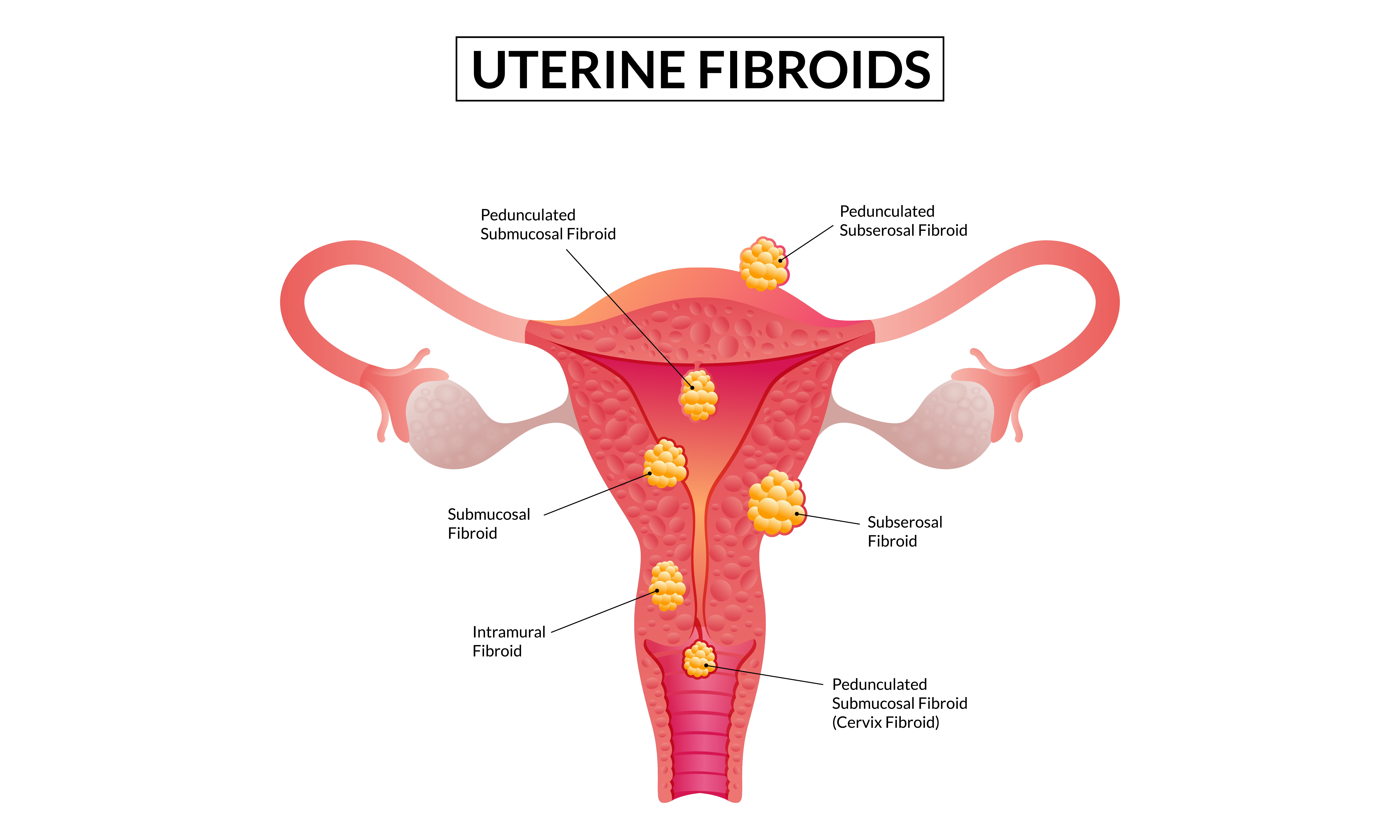Fibroids, also known as uterine leiomyomas, are noncancerous growths that develop within the uterus. They are relatively common and affect a significant number of women during their mid and late reproductive years. While fibroids are generally benign, they can cause discomfort and lead to various complications. In this blog post, we will delve into the world of fibroids, exploring their causes, symptoms and available treatment options.

The exact cause of fibroids remains unknown; however, several factors contribute to their development. Genetic factors, family history and racial disparities have been identified as potential risk factors for fibroid development. Hormones, primarily estrogen and progesterone, play a vital role in stimulating the growth of uterine tissue during each menstrual cycle. An imbalance in these hormones can also lead to the formation of fibroids.
The symptoms of fibroids can vary significantly from woman to woman. While some women may not experience any noticeable symptoms, others may face a range of symptoms that can impact their quality of life. The common symptoms of fibroids include:
1. Heavy or Prolonged Menstrual Bleeding: Fibroids can cause excessive menstrual bleeding, leading to prolonged periods or passing large blood clots.
2. Pelvic Pain and Pressure: Fibroids can cause discomfort and a feeling of pressure in the pelvic region, leading to lower back pain or generalized pelvic pain.
3. Urinary and Bowel Problems: Large fibroids can press against the bladder, resulting in frequent urination or difficulty emptying the bladder. In some cases, fibroids may also cause constipation or rectal pain.
4. Abdominal Swelling: Larger fibroids may cause the abdomen to enlarge, leading to visible swelling or bloating.
5. Infertility or Pregnancy Complications: Depending on their size and location, fibroids can interfere with fertility or lead to complications during pregnancy, such as an increased risk of miscarriage or premature labour.

The treatment options for fibroids depend on various factors, including the severity of symptoms, the size and location of fibroids and the patient's reproductive plans. Here are some commonly recommended treatment approaches:
1. Watchful Waiting: In cases where fibroids are small, asymptomatic, or nearing menopause, a "watchful waiting" approach may be advised. Regular monitoring is necessary to ensure the fibroids do not cause significant symptoms or complications.
2. Medications: Hormonal medications, such as birth control pills or gonadotropin-releasing hormone agonists (GnRH agonists), can help manage symptoms by regulating hormonal imbalances and reducing the size of fibroids. However, these medications provide temporary relief and do not eliminate fibroids entirely. These are mostly used to buy time e.g. when a symptomatic woman is not fit for an operative procedure and is likely to be so in a few months.
3. Minimally Invasive Procedures: Several minimally invasive procedures can be performed to treat fibroids while preserving the uterus. These include:
a. Uterine Artery Embolization (UAE): This procedure involves blocking the blood supply to fibroids, causing them to shrink and reduce symptoms.
b. Magnetic Resonance-guided Focused Ultrasound Surgery (MRgFUS): High-intensity ultrasound waves are used to destroy fibroid tissue without the need for incisions or surgery.
c. Laparoscopic Myomectomy: In this surgical procedure, fibroids are removed while preserving the uterus, making it a suitable option for women desiring future pregnancies.
4. Hysterectomy: In severe cases where there are multiple big fibroids and fertility is not a concern a hysterectomy may be recommended. This surgical procedure involves the complete removal of the uterus, eliminating the possibility of fibroid recurrence.
Fibroids are common noncancerous growths that can cause a range of symptoms and complications in women. While the exact cause of fibroids remains unknown, hormonal imbalances, genetic factors and family history play a significant role. Recognizing the symptoms and seeking timely medical attention is crucial for proper diagnosis and treatment. With various treatment options available, including watchful waiting, medications, minimally invasive procedures and hysterectomies, women can work closely with their healthcare providers to determine the most suitable approach based on their individual circumstances. If you suspect you may have fibroids or are experiencing symptoms like increased pain and bleeding during periods, it is advisable to consult a healthcare professional for proper evaluation and guidance.

Want to consult the best gynecologists in India? Please find the links below.
Want to consult the best Maternity Packages in India? Please find the links below.